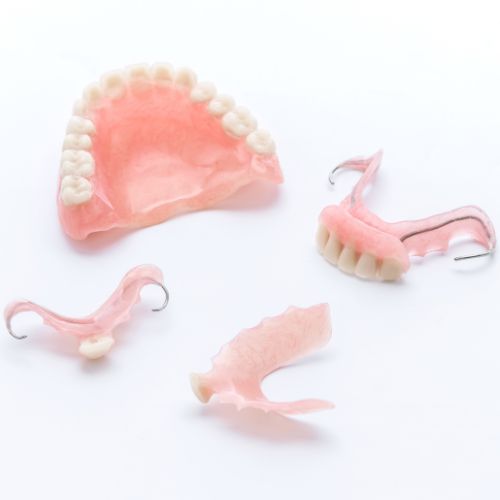- Full vs Partial Dentures
Full vs Partial Dentures: Which is Right for You?
For adults who are missing several teeth, dentures can be a great way to restore their smile, confidence, and functionality. Popular options available include full dentures and partial dentures. Both have their unique advantages and disadvantages, and it can be confusing to pick the right one for your situation. As your dentist in Pinellas Park, Florida, we are here to help you understand the difference between full vs partial dentures and guide you towards making the best decision.
Full Dentures
Full dentures are recommended for individuals with no remaining healthy teeth or those who need to have their remaining teeth extracted. A mold of your mouth is taken to ensure a comfortable and secure fit. Full dentures typically consist of an acrylic base that sits on the gum line and a set of prosthetic teeth that resemble the natural teeth. They are removable, which makes it easy to clean and maintain them. Full dentures can enhance your appearance, help you eat and speak better, and prevent further tooth loss. However, adjusting to full dentures can be difficult for some people, and it may take time to get used to them.
Partial Dentures
Partial dentures are designed for individuals who have some missing teeth but still have some healthy teeth remaining. They are made of a combination of plastic or acrylic base and metal framework that clips onto the remaining teeth. Partial dentures can be a cost-effective option and offer advantages such as improving your speech and preventing further tooth decay. They are also removable, making it easier to clean and maintain. However, some people may find partial dentures less comfortable than full dentures, and they may need adjustments to ensure the right fit.
Factors to Consider
When deciding between full and partial dentures, it’s important to consider various factors, such as your budget, dental health, and lifestyle needs. Full dentures are typically more costly than partial dentures but offer a more permanent solution for severe tooth loss. Partial dentures are often covered by dental insurance, making them a more affordable option for some patients. In terms of dental health, full dentures may offer better protection against gum disease and tooth decay. Your dentist can advise you on the best option based on your lifestyle and care requirements.
Care and Maintenance
Both full and partial dentures require regular care and maintenance to keep them clean and functional. You should rinse your dentures with warm water after eating and brush them with a soft-bristled brush and mild soap to remove food particles and stains. Avoid using hot water, bleach, or abrasive cleaners, as they can damage the acrylic or metal components. Store your dentures in a container filled with water or denture solution when you’re not wearing them. It’s also recommended to visit your dentist regularly for checkups and adjustments.
Contact Us Today!
In conclusion, choosing between full and partial dentures depends on various factors such as dental health, lifestyle needs, and budget. Both options can offer improved functionality, appearance, and confidence. Understanding the difference between the two and consulting with your dentist can help you make an informed decision that suits your needs best. At Park Boulevard Family Dentistry, we offer custom-made, high-quality dentures designed to fit your mouth and lifestyle. Contact us today to learn more about our denture services. Do not hesitate to make an appointment with us to learn more about how we can restore your smile and confidence.


